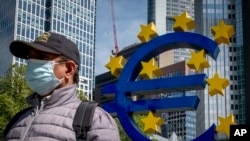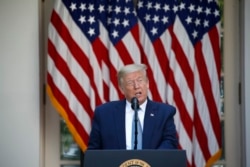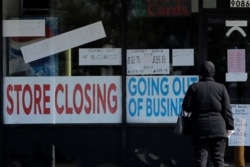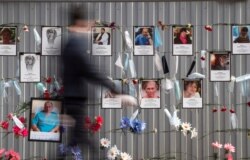The coronavirus pandemic continues to take a toll on national economies, with Germany among its latest victims.
The pandemic pushed the European economic powerhouse into a recession in the first quarter, as its economy shrank by 2.2 percent.
Germany’s federal statistics agency said Friday the economy’s decline over the last quarter in 2019 was “the worst since the global financial crisis” in 2009.
Meanwhile, Portugal’s economy contracted a sharp 3.9 percent in the first quarter from the previous quarter as the pandemic hit the country’s tourism-dependent sector particularly hard.
In Slovenia, the government declared an end to the epidemic Friday and opened its borders, although new cases were still being reported.
The Baltic countries of Estonia, Latvia and Lithuania lifted movement restrictions and established a free movement zone for themselves. Officials in Finland and Poland have indicated they may join the zone in the near future.
Despite the easing of restrictions in Europe, Norwegian Prime Minister Erna Solberg said Friday the country will probably maintain travel restrictions until August 20.
Solberg told reporters in Oslo, “We do not wish to maintain these (restrictions) longer than we have to,” but added, “my advice is to plan for the holidays in Norway.”
In the United States, the outbreak is taking its toll on the world’s largest economy with retail sales plunging a record 16.4 percent last month. The drop was steeper than expected as the coronavirus pandemic forced businesses across the country to close.
The United States leads the world in the number of infections, with more than 1.4 million cases and more than 87,000 fatalities.
U.S. President Donald Trump said Friday he is hopeful there will be a coronavirus vaccine by the end of the year. He said the U.S. government is investing in all the top vaccine candidates, which he said has been narrowed to 14 possibilities and will later be further narrowed.
However, Trump said that even without a vaccine, the United States must be prepared to reopen.
"Vaccine or no vaccine, we're back," Trump said.
The U.S. Federal Reserve warned Friday that the financial sector faces "significant" vulnerabilities because of the virus and could receive another shock if the global pandemic takes an “unexpected course.”
The United States is facing criticism from abroad for its handling of the outbreak.
The Lancet medical journal said in an editorial published Friday that U.S. citizens should vote a leader into the White House who can take a nonpartisan approach to public health issues.
“Americans must put a president in the White House come January, 2021, who will understand that public health should not be guided by partisan politics,” the editorial said. There was no immediate response from the White House.
In Canada, Prime Minister Justin Trudeau said the country would extend a costly wage subsidy program until August to help businesses keep their workers employed.
Meanwhile, China’s ambassador to the United Nations in Vienna, Wang Qun, accused the U.S. of eroding the world economy with trade barriers and extending the pandemic by suspending funding to the World Health Organization.
Trump cut funding to the WHO, saying the organization was slow in recognizing the gravity of the pandemic and “pushed China’s misinformation” about the virus.
Trump said his administration would halt funding while conducting a 60- to 90-day review of the WHO, redirecting the money to other groups and countries.
In the Philippines, officials are worried that the coronavirus will have an explosive spread, now that tens of thousands of people are sheltering in evacuation centers on the main island of Luzon. The island’s residents were forced to come out of a COVID-19 lockdown as Typhoon Vongfong pounded the island with heavy rains and winds, wrecking homes, quarantine facilities and schools.
Russia began random coronavirus testing Friday. It has the world’s second-highest number of COVID-19 cases, with more than 262,000.
Chile's special quarantine for its capital, Santiago, began Friday as authorities attempted to slow the rise in new coronavirus infections after briefly easing lockdown restrictions.
In Brazil, Health Minister Nelson Teich resigned on Friday after being on the job less than a month in a sign the government continues to struggle to combat the virus. The move comes a day after President Jair Bolsonaro increased pressure on Teich to expand the use of the antimalarial drug chloroquine for coronavirus patients. Teich’s predecessor was fired last month after he clashed with the president over the need for social distancing.
A Rohingya refugee in the massive Cox’s Bazar refugee camp in Bangladesh has tested positive for COVID-19 along with a local resident. Aid workers have warned that if the virus were introduced into the world’s largest refugee camp, it would likely spread quickly because of unsanitary conditions. Cox’s Bazar is home to nearly 1 million refugees from Myanmar.
A new modeling study by the World Health Organization warns that nearly a quarter of a billion people will eventually be infected by the virus and that 150,000 people in Africa could die if urgent action is not taken. The study, published Friday in the journal BMJ Global Health, projects lower infection rates and deaths in other parts of the world such as Europe and the U.S.
There were more than 4.5 million cases and more than 307,000 deaths worldwide Friday, according to Johns Hopkins University statistics.









